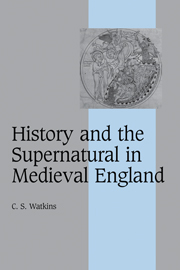Book contents
- Frontmatter
- Contents
- Preface
- Note on the text
- List of abbreviations
- INTRODUCTION
- Chapter 1 THINKING ABOUT THE SUPERNATURAL
- Chapter 2 INVENTING PAGANS
- Chapter 3 PRAYERS, SPELLS AND SAINTS
- Chapter 4 SPECIAL POWERS AND MAGICAL ARTS
- Chapter 5 IMAGINING THE DEAD
- Chapter 6 THINKING WITH THE SUPERNATURAL
- CONCLUSION
- Bibliography
- Index
- Cambridge Studies in Medieval Life and Thought Fourth Series
Chapter 5 - IMAGINING THE DEAD
Published online by Cambridge University Press: 23 June 2009
- Frontmatter
- Contents
- Preface
- Note on the text
- List of abbreviations
- INTRODUCTION
- Chapter 1 THINKING ABOUT THE SUPERNATURAL
- Chapter 2 INVENTING PAGANS
- Chapter 3 PRAYERS, SPELLS AND SAINTS
- Chapter 4 SPECIAL POWERS AND MAGICAL ARTS
- Chapter 5 IMAGINING THE DEAD
- Chapter 6 THINKING WITH THE SUPERNATURAL
- CONCLUSION
- Bibliography
- Index
- Cambridge Studies in Medieval Life and Thought Fourth Series
Summary
The thirteenth century witnessed a major effort by the church to strengthen universal values within local religious cultures and, through them, to reinforce in parochial religion common practices designed to prepare the soul for the next world. The Fourth Lateran Council of 1215 marks a significant staging-post in this process and in England transformed an existing trickle of diocesan legislation into a flood. Synodal statutes produced for the majority of dioceses indicate the development of programmes of basic religious instruction for the laity and elaborated sacramental obligations laid on all parishioners. The outward forms of this pastoral transformation are well known. Priests were required to instruct parishioners more closely in the faith, regular preaching became an expectation and parishioners were compelled to make confession and take communion at least on an annual basis. But if the new religious discipline was to take root in the localities it needed to be underpinned by a practical theology which priests might preach and parishioners might be willing to accept. We are not, in other words, dealing with simple imposition here but the creation of systems of belief and praxis which could be promoted effectively in the parishes. Central to this development was the effective negotiation of the needs of body and soul in a system of practice which placed salvation within the grasp of ordinary believers, obliged as they were to struggle through life in a sinful world.
- Type
- Chapter
- Information
- History and the Supernatural in Medieval England , pp. 170 - 201Publisher: Cambridge University PressPrint publication year: 2007

